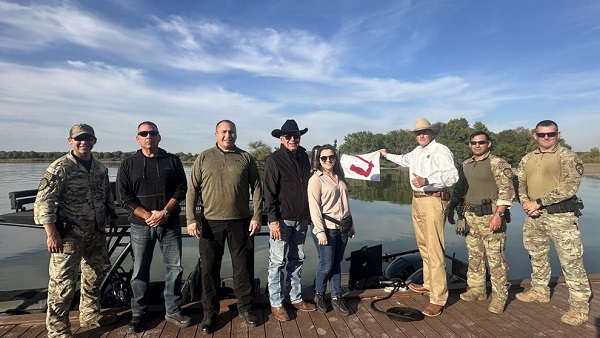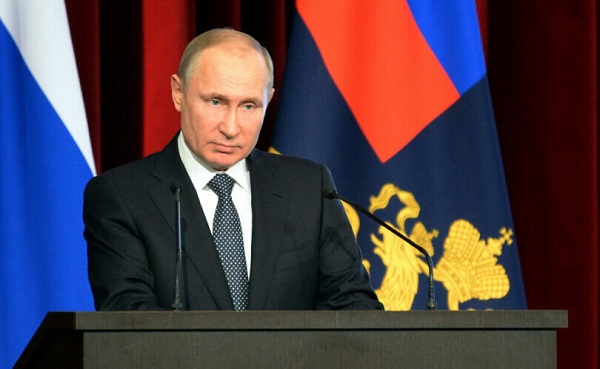Uncategorized
India, Pakistan resume shelling in Kashmir, killing 6

SRINAGAR, India — Indian and Pakistani soldiers again targeted each other’s posts and villages along their volatile frontier in disputed Kashmir, killing at least six civilians and wounding six others, officials said Saturday.
Tensions have been running high since Indian aircraft crossed into Pakistan on Tuesday, carrying out what India called a pre-emptive strike against militants blamed for a Feb. 14 suicide bombing in Indian-controlled Kashmir that killed 40 Indian troops. Pakistan retaliated, shooting down a fighter jet Wednesday and detaining its pilot, who was returned to India on Friday in a peace gesture.
Fighting resumed overnight into dawn Saturday, leaving two siblings and their mother dead in Indian-controlled Kashmir. The three died after a shell fired by Pakistani soldiers hit their home in the Poonch region near the Line of Control that divides Kashmir between the nuclear-armed rivals, Indian police said. The children’s father was critically wounded.
In Pakistan-controlled Kashmir, government official Umar Azam said Indian troops with heavy weapons “indiscriminately targeted border villagers” along the Line of Control, killing a boy and wounding three other people. He said several homes were destroyed by Indian shelling.
Shelling and firing of small arms began again Saturday after a lull of a few hours. A Pakistani military statement said two civilians were killed and two others wounded in the fresh fighting. The Indian army said Pakistani troops attacked Indian posts at several places along the militarized line.
Officials from both countries used the routine description for the military confrontations, saying their soldiers retaliated “befittingly,” and blamed each other for “unprovoked” violations of the 2003 cease-fire accord at several sectors along the Kashmir frontier, targeting army posts as well as villages.
Since tensions escalated following the Feb. 14 suicide attack, world leaders have scrambled to head off an all-out war between India and Pakistan. The rivals have fought two of their three wars over Kashmir since their independence from British rule in 1947.
The current violence marks the most serious escalation of their long-simmering conflict since 1999, when Pakistan’s military sent a ground force into Indian-controlled Kashmir. That year also saw an Indian fighter jet shoot down a Pakistani naval aircraft, killing all 16 on board.
The latest wave of tensions began after the militant group Jaish-e-Mohammad claimed responsibility for the suicide bombing by a Kashmiri militant on Indian paramilitary forces. India has long accused Pakistan of cultivating such militant groups to attack it. Pakistan has said it was not involved in that attack and that it was ready to help New Delhi in the investigation.
On both sides of Kashmir, thousands of people have fled to government-run temporary shelters or relatives’ homes in safer areas to escape deadly and relentless shelling along the frontier. Many of these villages dot the rugged and mountainous frontier, which is marked by razor wire, watch towers and bunkers amid tangled bushes, forests and fields of rice and corn.
“These battles are fought on our bodies, in our homes and fields, and we still don’t have anything in our hands. We are at the mercy of these soldiers,” said Mohammed Akram, a resident in the Mendhar area in Indian-controlled Kashmir.
Sakina, a young woman who fled to a shelter with her two children, said the frequent shelling had made them “homeless in our own land.”
In Pakistani-administered Kashmir, many displaced families urged the international community to help resolve the issue of Kashmir so that they can live peacefully.
“Whenever India fires mortars, it’s we who suffer,” said Mohammad Latif, a
“I don’t care whether the Indian pilot is gone or not, I don’t care who released him and why, but I want to know whether peace will return to us after his return to India,” said Mohammad Sadiq, a shopkeeper who also was among the displaced. He said the latest tensions between Pakistan and India rose so suddenly that some people sold their sheep, cows and buffaloes at throwaway prices in his native Chikothi town.
“We did not know whether we will get any shelter and how could we take our animals” with us, he said.
People living along the Line of Control keep bunkers near their homes, but residents say they cannot spend day and night in them.
India accuses Pakistan of arming and training the rebels and sending them into Indian-controlled Kashmir to launch attacks against government targets. Pakistan denies the charge, saying it provides moral and diplomatic support to Kashmiris fighting for right to self-determination.
Rebel groups have been fighting Indian rule since 1989 and demand that Kashmir be united either under Pakistani rule or as an independent country. Anti-India sentiment runs deep in the region, and most people support the rebels’ cause against Indian rule while also participating in civilian street protests against Indian control. Nearly 70,000 people have been killed in the uprising and the ensuing Indian military crackdown.
___
Mughal reported from Muzafarabad, Pakistan. Associated Press writer Munir Ahmed in Islamabad contributed to this report.
Roshan Mughal And Aijaz Hussain, The Associated Press
Uncategorized
Cost of bureaucracy balloons 80 per cent in 10 years: Public Accounts

The cost of the bureaucracy increased by $6 billion last year, according to newly released numbers in Public Accounts disclosures. The Canadian Taxpayers Federation is calling on Prime Minister Mark Carney to immediately shrink the bureaucracy.
“The Public Accounts show the cost of the federal bureaucracy is out of control,” said Franco Terrazzano, CTF Federal Director. “Tinkering around the edges won’t cut it, Carney needs to take urgent action to shrink the bloated federal bureaucracy.”
The federal bureaucracy cost taxpayers $71.4 billion in 2024-25, according to the Public Accounts. The cost of the federal bureaucracy increased by $6 billion, or more than nine per cent, over the last year.
The federal bureaucracy cost taxpayers $39.6 billion in 2015-16, according to the Public Accounts. That means the cost of the federal bureaucracy increased 80 per cent over the last 10 years. The government added 99,000 extra bureaucrats between 2015-16 and 2024-25.
Half of Canadians say federal services have gotten worse since 2016, despite the massive increase in the federal bureaucracy, according to a Leger poll.
Not only has the size of the bureaucracy increased, the cost of consultants, contractors and outsourcing has increased as well. The government spent $23.1 billion on “professional and special services” last year, according to the Public Accounts. That’s an 11 per cent increase over the previous year. The government’s spending on professional and special services more than doubled since 2015-16.
“Taxpayers should not be paying way more for in-house government bureaucrats and way more for outside help,” Terrazzano said. “Mere promises to find minor savings in the federal bureaucracy won’t fix Canada’s finances.
“Taxpayers need Carney to take urgent action and significantly cut the number of bureaucrats now.”
Table: Cost of bureaucracy and professional and special services, Public Accounts
| Year | Bureaucracy | Professional and special services |
|
$71,369,677,000 |
$23,145,218,000 |
|
|
$65,326,643,000 |
$20,771,477,000 |
|
|
$56,467,851,000 |
$18,591,373,000 |
|
|
$60,676,243,000 |
$17,511,078,000 |
|
|
$52,984,272,000 |
$14,720,455,000 |
|
|
$46,349,166,000 |
$13,334,341,000 |
|
|
$46,131,628,000 |
$12,940,395,000 |
|
|
$45,262,821,000 |
$12,950,619,000 |
|
|
$38,909,594,000 |
$11,910,257,000 |
|
|
$39,616,656,000 |
$11,082,974,000 |
Uncategorized
Trump Admin Establishing Council To Make Buildings Beautiful Again


From the Daily Caller News Foundation
By Jason Hopkins
The Trump administration is creating a first-of-its-kind task force aimed at ushering in a new “Golden Age” of beautiful infrastructure across the U.S.
The Department of Transportation (DOT) will announce the establishment of the Beautifying Transportation Infrastructure Council (BTIC) on Thursday, the Daily Caller News Foundation exclusively learned. The BTIC seeks to advise Transportation Secretary Sean Duffy on design and policy ideas for key infrastructure projects, including highways, bridges and transit hubs.
“What happened to our country’s proud tradition of building great, big, beautiful things?” Duffy said in a statement shared with the DCNF. “It’s time the design for America’s latest infrastructure projects reflects our nation’s strength, pride, and promise.”
“We’re engaging the best and brightest minds in architectural design and engineering to make beautiful structures that move you and bring about a new Golden Age of Transportation,” Duffy continued.
Mini scoop – here is the DOT’s rollout of its Beautifying Transportation Infrastructure Council, which will be tasked with making our buildings beautiful again. pic.twitter.com/
9iV2xSxdJM — Jason Hopkins (@jasonhopkinsdc) October 23, 2025
The DOT is encouraging nominations of the country’s best architects, urban planners, artists and others to serve on the council, according to the department. While ensuring that efficiency and safety remain a top priority, the BTIC will provide guidance on projects that “enhance” public areas and develop aesthetic performance metrics.
The new council aligns with an executive order signed by President Donald Trump in August 2025 regarding infrastructure. The “Making Federal Architecture Beautiful Again” order calls for federal public buildings in the country to “respect regional architectural heritage” and aims to prevent federal construction projects from using modernist and brutalist architecture styles, instead returning to a classical style.
“The Founders, in line with great societies before them, attached great importance to Federal civic architecture,” Trump’s order stated. “They wanted America’s public buildings to inspire the American people and encourage civic virtue.”
“President George Washington and Secretary of State Thomas Jefferson consciously modeled the most important buildings in Washington, D.C., on the classical architecture of ancient Athens and Rome,” the order continued. “Because of their proven ability to meet these requirements, classical and traditional architecture are preferred modes of architectural design.”
The DOT invested millions in major infrastructure projects since Trump’s return to the White House. Duffy announced in August a $43 million transformation initiative of the New York Penn Station in New York City and in September unveiledmajor progress in the rehabilitation and modernization of Washington Union Station in Washington, D.C.
The BTIC will comprise up to 11 members who will serve two-year terms, with the chance to be reappointed, according to the DOT. The task force will meet biannually. The deadline for nominations will end Nov. 21.
-

 Alberta1 day ago
Alberta1 day agoThe Recall Trap: 21 Alberta MLA’s face recall petitions
-

 illegal immigration1 day ago
illegal immigration1 day agoUS Notes 2.5 million illegals out and counting
-

 International1 day ago
International1 day agoTyler Robinson shows no remorse in first court appearance for Kirk assassination
-

 Business2 days ago
Business2 days agoHigh-speed rail between Toronto and Quebec City a costly boondoggle for Canadian taxpayers
-

 Business2 days ago
Business2 days agoThe world is no longer buying a transition to “something else” without defining what that is
-

 Energy1 day ago
Energy1 day agoCanada’s future prosperity runs through the northwest coast
-

 2025 Federal Election2 days ago
2025 Federal Election2 days agoToo Close for Comfort: Carney Floor Crosser Comes From a Riding Tainted by PRC Interference
-

 illegal immigration2 days ago
illegal immigration2 days agoEXCLUSIVE: Canadian groups, First Nation police support stronger border security










